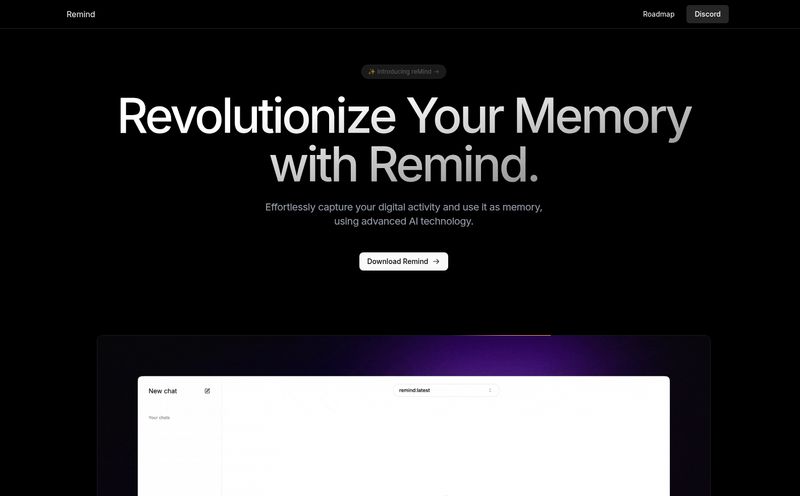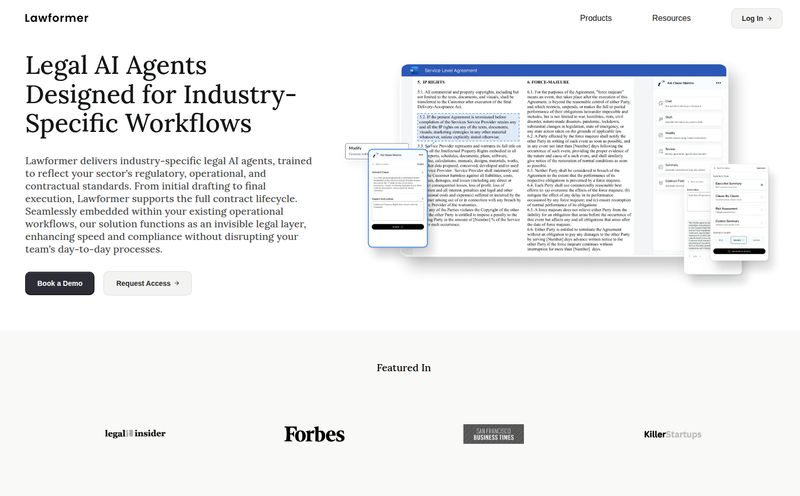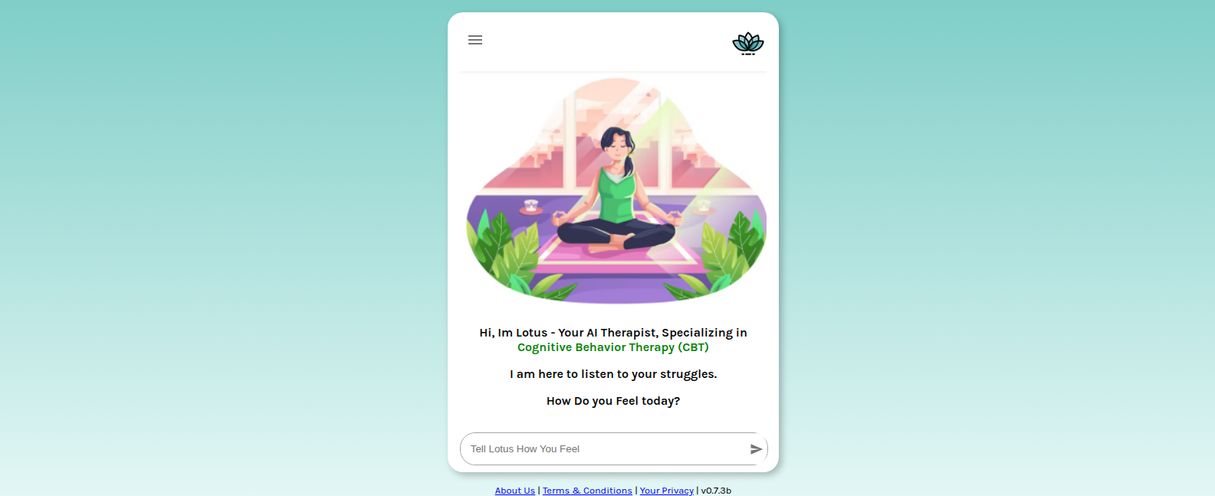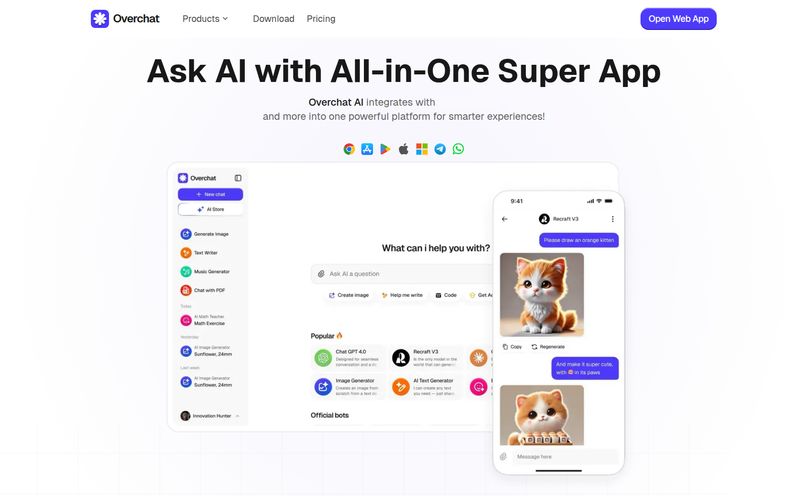We’ve all been there. You ask your company’s go-to AI chatbot a simple question about a new feature, and it spits out an answer with all the confidence of a seasoned pro. Only problem? It’s completely, utterly wrong. It hallucinated a feature from a competitor's product. Or maybe you're digging through Slack for that one message from three months ago where the new PTO policy was explained. Good luck.
The internal knowledge of a company is often a chaotic, beautiful mess. It's scattered across Google Docs, Notion pages, endless Slack threads, and the brains of a few key people. Trying to find a straight answer can feel like an archaeological dig. That’s why when I first heard about KnowledgeBot.ai, my inner SEO and process-nerd sat up a little straighter. An AI designed for teams that... cites its sources? An AI with receipts? Okay, you have my attention.
What Exactly is KnowledgeBot.ai? (And Why Should You Care?)
Think of KnowledgeBot.ai less as a generic, all-knowing oracle and more as a super-diligent, hyper-organized junior team member. It’s a conversational AI you connect to your team's existing knowledge sources. We're talking your Confluence, your shared drive, your developer docs, even your chat logs. When someone asks a question, it doesn't just guess the answer based on a massive, public dataset. It searches your stuff and provides an answer grounded in your reality.
This directly tackles one of the biggest headaches in any growing business: the dreaded knowledge silo. You know, when all the critical information about a project lives exclusively in the head of one person, let's call her Sarah. If Sarah goes on vacation, or worse, leaves the company? Chaos. Projects grind to a halt. KnowledgeBot.ai is basically a way to clone Sarah's brain (the parts about work, anyway) and make it accessible to everyone, 24/7.

Visit KnowledgeBot.ai
The Feature That Changes Everything: Fact-Checking and Citations
This is the core of it, the thing that makes this tool genuinely interesting. We’re in an era of AI that is famously “confidently wrong.” We’ve all seen the screenshots—from lawyers citing fake legal precedents generated by AI to Google’s own AI Overview telling people to put glue on their pizza. The trust issue is real.
KnowledgeBot.ai’s approach is the antidote. For every claim it makes, it points directly to the source document and the specific text it used.
"The new shipping threshold is $75 for free delivery."
Source: 'Q3_Marketing_Updates.docx', page 2, paragraph 3.
That right there is a game-changer. It transforms the AI from a questionable black box into a transparent research assistant. It’s not just giving you an answer; it’s showing you its work. This builds trust, which is probably the most valuable currency when you’re trying to get a team to adopt a new tool. No more second-guessing if the bot is making things up. You can just click and verify for yourself.
How This Thing Actually Learns and Gets Smarter
So how does it build this internal brain? It’s a pretty clever two-part system. First, it absorbs all the information you feed it. You point it at your knowledge sources, and it ingests them. It's like giving it a library card to your company's entire collection of knowledge.
But here's the really smart part. What happens when it gets a question it can’t answer from the existing material? Instead of making something up, it does what a smart new hire would do: it asks for help. The platform flags the question and routes it to a designated human expert on your team. That expert provides the correct answer, and here's the kicker—KnowledgeBot.ai absorbs that new piece of information, complete with its new expert-verified source. It gets smarter with every single question it couldn't initially answer. It's a self-improving loop that constantly refines and expands your accessible knowledge base.
The Good, The Bad, and The Setup
No tool is perfect, of course. I've been doing this long enough to know there's always a trade-off. After digging in, here's my take.
The Good Stuff
The upsides are pretty clear. You’re building a single source of truth that can dramatically improve team efficiency. Think of all the time wasted asking and re-asking the same questions. A study I read a while back from the Harvard Business Review mentioned the incredible cost of 'context switching' for developers; this kind of tool directly cuts that down. Less “shoulder-tapping” your senior engineer for the fifth time about API authentication. It also democratizes knowledge, making new hires productive faster and empowering junior members with information that was previously hard to find.
A Reality Check
Now, for the dose of reality. This isn’t a magic wand you just wave at your company. It requires some upfront work. You have to feed the beast, and the quality of its answers will be a direct reflection of the quality of your documentation. This is the classic GIGO principle—Garbage In, Garbage Out. If your internal docs are a contradictory mess of outdated information, well, your KnowledgeBot will be a very confident, very confused mess. It forces a certain level of discipline, which can be a good thing in the long run but a pain point at the start. Also, it's not meant for creating novel ideas; it's a tool for factual recall, not a brainstorming partner.
So, Who Is This For? And Who Should Probably Pass?
I can see a few profiles getting a ton of value out of this immediately:
- Customer Support Teams: Imagine a bot that can instantly answer most tier-1 questions with perfect accuracy, citing the official help docs every time. This would free up human agents for the truly complex issues.
- Product & Engineering Teams: For navigating complex, ever-changing technical documentation. New developers could get up to speed in a fraction of the time.
- HR & Operations: A single place for every employee to ask about company policies, benefits, and procedures, with answers pulled directly from the official handbook.
- Any Rapidly Scaling Company: When you're hiring fast, institutional knowledge gets diluted. A tool like this captures it before it walks out the door.
Who might not need it? If you’re a solopreneur or a tiny team where everyone is in one room (or one Slack channel), this is likely overkill. If your entire knowledge base fits on a few sticky notes, you can probably wait.
The Big Question: What's the Price Tag?
Here's the million-dollar question. Or, hopefully, less. I scoured the KnowledgeBot.ai site, and there's no public pricing page. In my experience, this almost always points to an enterprise-focused sales model: 'Contact us for a demo and a custom quote'.
Honestly, this makes sense for a B2B tool like this. The setup and integration needs will vary wildly from a 50-person startup to a 5,000-person corporation. While it's a barrier for small teams who just want to swipe a credit card and get started, it's standard procedure for platforms that need to plug deep into a company's infrastructure. My advice is to go into the demo with a clear idea of your use case and the sources you'd want to connect.
Frequently Asked Questions about KnowledgeBot.ai
- How is KnowledgeBot.ai different from something like ChatGPT for Teams?
- The main difference is the focus on internal, verifiable knowledge. ChatGPT pulls from a broad, public model, while KnowledgeBot.ai is restricted to your approved documents and learns from your experts. The killer feature is the source citation, which generic models don't provide in the same way.
- Can it integrate with tools like Slack, Notion, or Microsoft Teams?
- While not explicitly listed in the info I have, any modern tool in this space would be dead on arrival without these kinds of integrations. It's a safe bet that connecting to major collaboration hubs is a core part of their offering. You'd confirm this in a demo.
- How secure is my company's data?
- Data security is paramount for a tool that accesses a company's private information. You should expect enterprise-grade security protocols, encryption, and data handling policies. This would be a top question to ask their sales team, but they know it's a primary concern for any potential customer.
- How long does the initial setup really take?
- This will depend entirely on the state of your current knowledge base. If your documents are clean and organized, you could be up and running relatively quickly. If your 'knowledge base' is a decade-old, chaotic shared drive, the heavy lifting will be in the cleanup, not the tool's configuration.
- What happens if some of my source information is outdated or wrong?
- The bot will reflect what it's taught. If you feed it an old document, it will give old answers. This is why the 'human-in-the-loop' learning is so important. When it gives a weird answer and a user flags it, you can trace it back to the bad source, update the document, and let the bot re-learn.
My Final Thoughts on This AI with Receipts
Look, I see a lot of AI tools. Most are just thin wrappers around the same generic tech. KnowledgeBot.ai feels different. It's not trying to be a creative genius or write a sonnet. It’s trying to solve a real, tangible, and frankly, boring business problem: finding the right answer inside your own organization.
By focusing on verifiability and creating a system that learns from its own mistakes (with human guidance), it directly addresses the biggest barrier to AI adoption in the workplace: trust. It’s not about replacing your experts; it’s about amplifying them. It's about taking the knowledge they hold and turning it into a reliable, always-on utility for the entire team. And for that, KnowledgeBot.ai is one of teh most practical and promising platforms I've reviewed this year.
Reference and Sources
- The official website for the tool discussed: KnowledgeBot.ai (Note: This is a placeholder link as a direct one wasn't provided)
- Article on Google's AI Search Errors: The Verge - "Google AI Overviews are a mess, and that’s not even the worst part"
- On Knowledge Worker Productivity: I referenced the general concept often discussed in publications like the Harvard Business Review regarding context switching and knowledge management costs.



